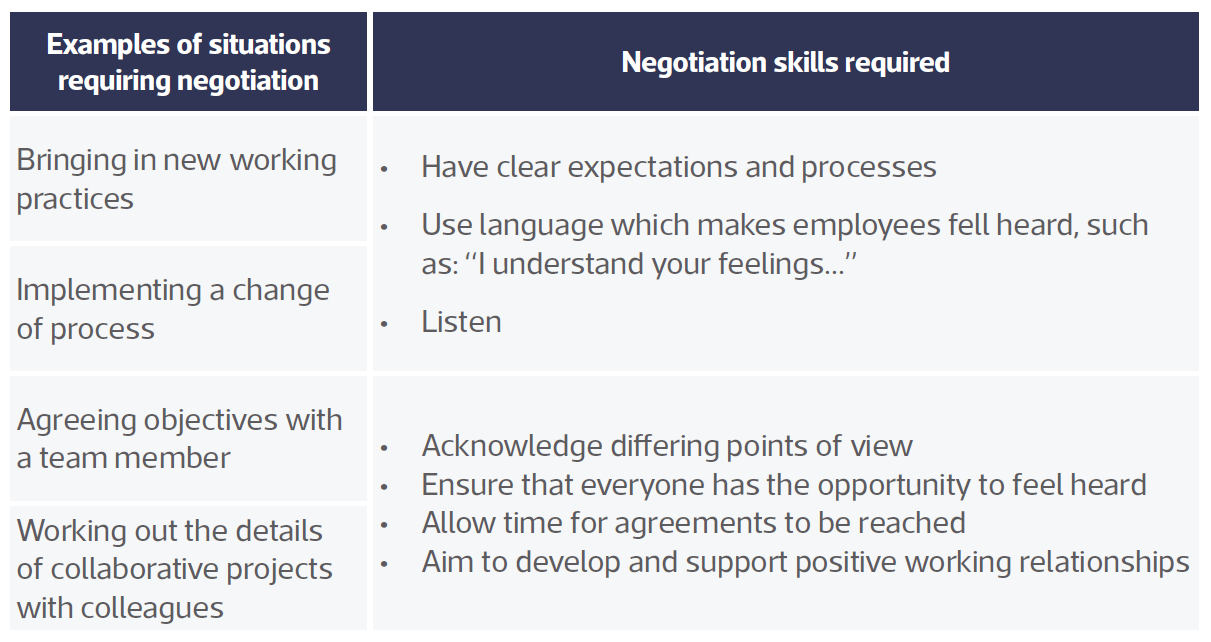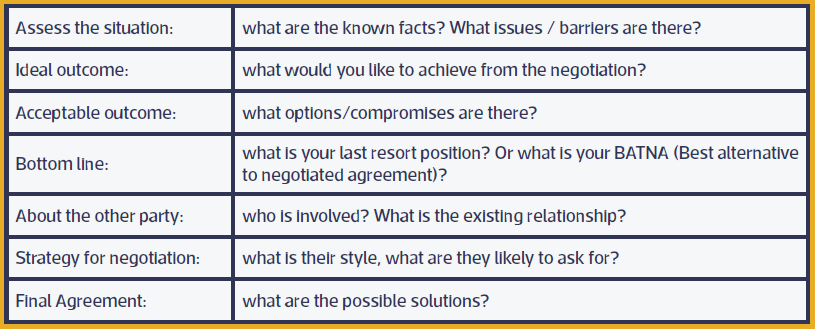What is Negotiation?
In its simplest terms, negotiation is a discussion intended to produce an agreement. It is the process of bargaining between individuals or groups with two or more interests.
Negotiation is a skill that is developed from a young age and when negotiation is undertaken in the workplace, it is often a complex and demanding process. It can be easy to get stuck in a particular way of thinking about how to negotiate, which can limit your efficiency and capability, so it is important to develop your negotiation skills through training and practice.
When you undertake negotiation your goal should be to achieve a mutually acceptable agreement, which accomplishes the objectives and does not leave either party feeling devalued. To do this effectively, you need to:
- Prepare for the negotiation
- Have sufficient understanding of the areas being discussed
- Be willing to compromise (depending on the situation)
- Demonstrate some degree of flexibility
Win:Win Negotiation
Negotiation is aimed at resolving conflict in situations where two parties want different things. Win:Lose negotiation is about ‘winning’ at all costs, even where the outcome of winning will have a considerable detrimental impact on the other party. Lose:Lose is a scenario where neither party benefits from the negotiation.
Win:win negotiation aims to resolve the conflict in a way that leaves both parties feeling they have in some respect ‘won’ when the negotiations are complete and is therefore what you should aim for.

Negotiation and Communication Skills
Communication skills are critical to achieving a Win:Win, and this means listening is just as important as talking:
“Negotiation is a two way street, a give and take scenario. The most successful negotiations are conversations, not arguments. Keep that in mind to make sure that you’re both speaking and listening. Taking the time to listen helps you maintain your composure and prevent emotions from taking over.”
Prossack, A. (2018)
Stages of negotiation
Most negotiations can be broken down into six main stages:
1. PREPARATION
Achieving objectives in the negotiation will be much easier if you are fully prepared. A successful negotiator will ensure that they are fully briefed, clear about their objectives and understand how best to present their case.
2.INITIAL EXCHANGES
At the beginning of the negotiation, both parties will be trying to find out and understand the others’ position and requirements. At this stage you should encourage the other side to say as much as possible, listen a lot and not reveal too much too soon.
3. BIDDING
In this phase both parties start to put forward their own offers of what they want to get out of the negotiation. Try to identify common ground that could form the basis of an agreement, consider possible areas of compromise and sticking points that will need to be resolved.
4. BARGAINING
At this stage both parties start to trade and exchange in the search for an agreement. Be clear about the issues you can concede on and what you need to hold out for (which offer the scope to lead to a Win:Win outcome). Difficult issues need to be resolved and there is a risk negotiations could break down if this cannot be achieved.
5. SECURING AGREEMENT
The final proposal should be put forward, leading to a comprehensive agreement which is easily understood by both parties. Your negotiation could still break down at this stage if one party feels they are being asked to compromise to a greater extent, or if new conditions are added to the agreement. If either of these situations occurs, you may find that offering a small, unrelated concession, as a gesture of goodwill helps to secure a final agreement.
6. IMPLEMENTATION
The implementation plan will need to incorporate the following:
- Who should be informed of this outcome.
- A comprehensive list of necessary actions
- Timescales or deadlines for each of the actions
- A clear understanding of who will be responsible for carrying out each action
- The resources and information that will be necessary to carry out the actions
- Who else needs to be involved or informed
- Arrangements for coordination and monitoring
- How to review the implementation and evaluate the effectiveness of the negotiated solution
Practical tips when preparing to negotiate

Grow your team's skills, elevate your brand reputation and more, with our corporate solution.
References
Bird, J. and Gornall, S. (2019). How to Work with People . . . and Enjoy It! Routledge
Fisher, E & Ury, W (2008). Getting to Yes: Negotiating Agreement Without Giving In 2nd Ed. Penguin
Richards, P (2017). Negotiating Skills for Teachers http://work.chron.com/negotiating-skills-teachers-12677.html
Scott, B (2005). The Skills of Negotiating Jaico Publishing House
Prossack, A. (2018). The Benefits Of Everyday Negotiations https://www.forbes.com/sites/ashiraprossack1/2018/02/13/the-benefits-of-everyday-negotiations/
Are you an effective negotiator? Test yourself with our Scorecard.
If you’re a member, you can test yourself on Negotiating and see if you meet the standard.
Spotlights
Further Resources
From the Blog





